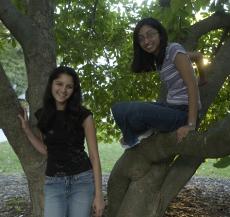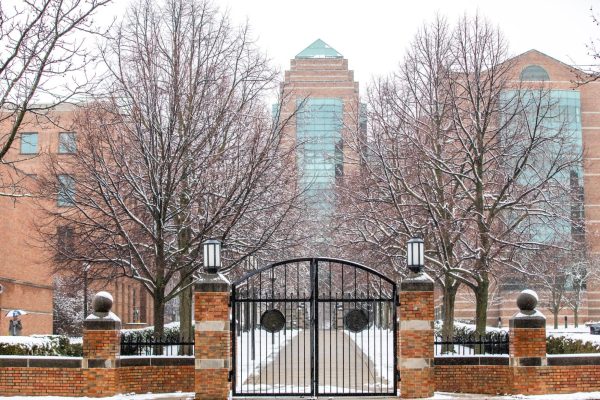Roommates break down religious barriers, bond in spite of differences

Lauren Lenkowski
Sep 23, 2004
HinduMuslim. MuslimHindu. That’s quite possibly the closest you’ll see those two together with nothing separating them. No hyphen separating the two into a Hindu-Muslim conflict. No table separating the two sides while they wrangle over peace talks that have been dragging on for decades. No cease-fire line separating the land while attempting to unite the people.
One would be hard-pressed to find them without some sort of physical, political or social separation anywhere in the world. However, exceptions and hope are often times found in the least likely of places: Urbana, Ill.
Ritu Parikh and Shaheja Sitafalwalla, freshmen in LAS, are roommates at Lincoln Avenue Residence hall. They might not seem like a pair of people who are changing generations of precedent, especially considering their fairly normal lives. They both volunteered frequently at a hospital, they were both members of the National Honor Society, and they enjoy listening to Maroon 5, Dave Matthews Band and U2. But what might seem to be a small detail to the average person turns into a big deal in light of current and historical events: Sitafalwalla is Muslim and Ritu is Hindu.
With the collapse of the fragile unity created by Mahatma Gandhi during the independence movement in India, Hindus and Muslims have brutally clashed in India, Pakistan and Kashmir for decades. According to The Guardian Unlimited, a UK newspaper, between the years 1990 and 2002, 60,000 to 75,000 people have died because of the conflict. Politics has only escalated the conflict.
“Both religions are peaceful religions. But when you mix emotions, history and warfare it becomes a big mess,” Parikh said.
Get The Daily Illini in your inbox!
This can be credited in large part to their past experiences, which they said have helped shape their present beliefs. Both have always been interested in religions, current events, politics, and social issues – interests that have developed into a genuine curiosity to explore diversity.
“I think we try to learn about each other’s religions,” Parikh said. “We talk less about the tensions (between the two religions) and more about the ideas, faith and philosophy.”
Even though both are interested in other religions it hasn’t been due to a lack of faith in their own. Sitafalwalla explained that both are proud of their religion so they’re more willing to share their beliefs with each other.
Both come from very religious families. Historically, this may have pointed to a more conservative and intolerant upbringing, but they buck the trend here too.
Sitafalwalla’s grandfather, who is a devout Muslim, has seemingly discarded the negative notions many people of his generation have against Hindus, Sitafalwalla said. In fact, she said her grandfather respectfully calls a Hindu lady that lives nearby “sister.” Also, in honor of the Hindu lady’s religion, during a Hindu festival called Raksha Bandhan (a ceremony to remind a brother of his duty to protect his sister) he allowed her to tie a rakhi on his wrist to remind him of that vow. A rakhi is a bracelet that symbolizes the vow to protect one’s sister and treat all women with dignity. Because Sitafalwalla was visiting, her grandfather encouraged her to tie a rakhi also.
Unfortunately, not everyone has been that accepting. Parikh and Sitafalwalla said they recognize that their parents might have reservations.
“They’ve seen things in India so they have prejudices because of what they’ve been through and witnessed,” Ritu said.
Sitafalwalla said her parents benefited from being the only Muslims in their village because it forced them to interact with Hindus, while the opposite holds true for Parikh’s parents. Parikh said she feels some of her parents’ negative perceptions might stem from their strong religious background and close ties with other devoutly religious family friends.
Regardless of their pasts, Parikh’s and Sitafalwalla’s parents gave them permission to room together and are becoming more open-minded with time, Sitafalwalla said.
She added that most other people have been agreeable with their choice.
“A lot of people assume my roommate is Muslim and when they find out she’s not they are like ‘Oh,'” she said.
Aside from the occasional moment’s pause after they find out that a Hindu and Muslim are rooming together, Parikh and Sitafalwalla said most people in America tend to be open to the idea.
They feel that the same wouldn’t be true in India or Pakistan.
Both Sitafalwalla and Parikh feel that it probably wouldn’t be possible to live together because “over here you hear about the conflict,” Parikh said. “There you witness it. You wouldn’t be as accepting.”
They aren’t set out to change people’s minds in India or Pakistan but they have been doing just that in America by quite simply getting along.
Rishi Shah, who has known Sitafalwalla and Parikh for more than two years, said Parikh is more of a listener, not a talker, when it comes to religion. Shah said Parikh also isn’t very religious in the sense that she practices a great deal of Hinduism but more spirituality. “She questions why humans exist.” On the other hand, Shah said that Sitafalwalla is a person of great conviction and firm beliefs.
Zenobia Rajvi met Sitafalwalla in middle school and Parikh in high school. She described Parikh as a person who is “very honest,” and “very very caring.” Parikh and Sitafalwalla live the qualities that will be required if they are to break the walls separating the land, countries and minds and to hold hands in a strong friendship.
Sitafalwalla said it isn’t true that the more religious you are the more intolerant you are.
“You’ll understand that we’re all from the same one God, by whatever name you want to call it, Allah … whatever, and so you become more accepting of other religions,” she said. “You see that it’s just different paths to the same goal.”





